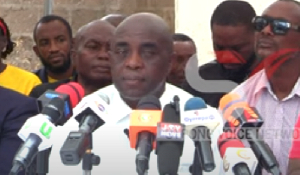- Home - Entertainment
- Lifestyle News
- Entertainment Videos | TV
- Year In Review
- Music News
- Entertainers
- Entertainment Archive
- Entertainment Photos
- Jokes
- Entertainment Headlines
- Ameyaw Debrah
- Brown GH
- Celebrities Buzz
- GH Base
- Ghana Celebrities
- Gh Gossip
- GH Page
- GH Splash
- Hot Gossip GH
- YEN

General News of Friday, 4 June 1999
Source: --
Demolition exercise lawful - Minister
Accra (Greater Accra) 4th June '99
Lieutenant-Colonel E. K. T. Donkoh, Minister of Defence on Thursday told Parliament that the Ghana Armed Forces acted within the law by assisting the Accra Metropolitan Assembly (AMA) in demolishing Pier Hotel, in Accra.
He said the legality of the assistance provided by the Military in the demolition exercise, rests on three sources or authority, which are all constitutional.
The Minister was responding to an urgent question posed by Mr J. H. Mensah, the Minority Leader, on the demolition of the Hotel.
Mr Mensah wanted to know on whose orders the Armed Forces took part in the exercise to demolish the Hotel and whether those orders were lawful in terms of the Armed Forces Act and the military aspect of the demolition exercise, which Armed Forces personnel were sent to handle.
Lt-Col Donkoh cited Article 210 clause three of the Constitution and said the President, as the Commander-in-Chief of the Ghana Armed Forces, has the power to deploy the Armed Forces for both the defence of Ghana and for civilian roles that contribute to the development of the country.
The constitutional provision states, "The Armed Forces shall be equipped and maintained to perform their role of defence of Ghana as well as such other functions for the development of Ghana as the President may determine".
The Minister said the defence policy of Ghana as determined by the President and the cabinet, directs the Ghana Armed Forces to perform roles that contribute to the social, economic, political and cultural development of the country.
He said it is precisely in this context that the Armed Forces provide such non-military or civilian services such as search and rescue operation, humanitarian intervention during periods of disaster, construction of bridges and other civilian structures and security for bullion transportation.
He said the third source of legitimacy for the Armed Forces involvement in the demolition exercise is found in the bye-laws of district assemblies, which empower the AMA, for instance, to demolish structures, which are illegally constructed.
Lt-Col Donkoh told the House that the Armed Forces, conscious of AMA's responsibility and power for such demolition, performed the necessary constitutional and civil duty of providing the assembly with the requisite expertise and equipment, for the "safe and effective demolition of the Pier Hotel".
He noted that the military assistance rendered to the AMA in the demolition exercise, is neither unique nor a novel development and said there had been several such collaboration between the Armed Forces and civilian authorities in the past.
He mentioned that in 1998, the Kumasi Metropolitan Assembly (KMA) was assisted by the military in the demolition of illegal structures in the area of the Owabi Water Works.
Also, the Minister said, early this year, the AMA was assisted by the Armed Forces in the removal of a "bunker-like" reservoir from the 37 Military Hospital's car park.
Lt-Col Donkoh told Parliament that upon a request by AMA to the general headquarters of the Armed Forces for assistance in personnel and equipment, the 48 Engineer Regiment of the Ghana Army (the unit responsible for construction and demolition tasks of the military), was ordered to provide the necessary assistance.
He explained that the order conformed to standing operating procedures of the Ghana Armed Forces and said the equipment provided by the unit included two excavators, one bulldozer, two low-loaders and explosives while the squad comprised plant operators, demolition experts and soldiers, who secured the area of operation.
On the military aspect of the demolition exercise, which the Ghana Armed Forces personnel were sent to handle, Lt-Col Donkoh explained that apart from the use of the military for civilian functions as directed by the constitution and the government's defence policy, it required demolition experts to undertake the exercise.
Troops were also needed to cordon off the area, he added.
On a suggestion that helicopters were used to secure the air as well as guns in the demolition exercise, creating panic of some sort, Lt-Col Donkoh said no helicopters were involved in the exercise, neither was any gun used, adding that the squad carried only normal rifles.
He explained that to the military, guns refer to artillery and stressed that no such weapons were used.
He said the squad carried rifles to cordon off the area to prevent any intrusion by civilians.
Asked whether it was the President or the Chief of Defence Staff, who gave the order for the military involvement in the demolition, the Minister replied that the exercise was carried out on the orders of the General Headquarters of the Ghana Armed Forces.
He reiterated that the orders conformed to military standing operating procedures.
Asked by which means the request was made, Lt-Col Donkoh said as a Minister, he was not privy to how the request was made.
Pressed further whether the request was by telephone, the Minister replied, "I do not know".
Asked what special circumstance demanded that the military should be involved in the demolition of the Hotel, he explained the Armed Forces involvement by saying the hotel was situated in a security zone and it needed a specialised unit such as the 48 Engineer Regiment to undertake the exercise.
The Minister accepted a request to give the House a closed sitting briefing at a later date, on military/civilian collaboration to enable members to have a better understanding of such relationship.










